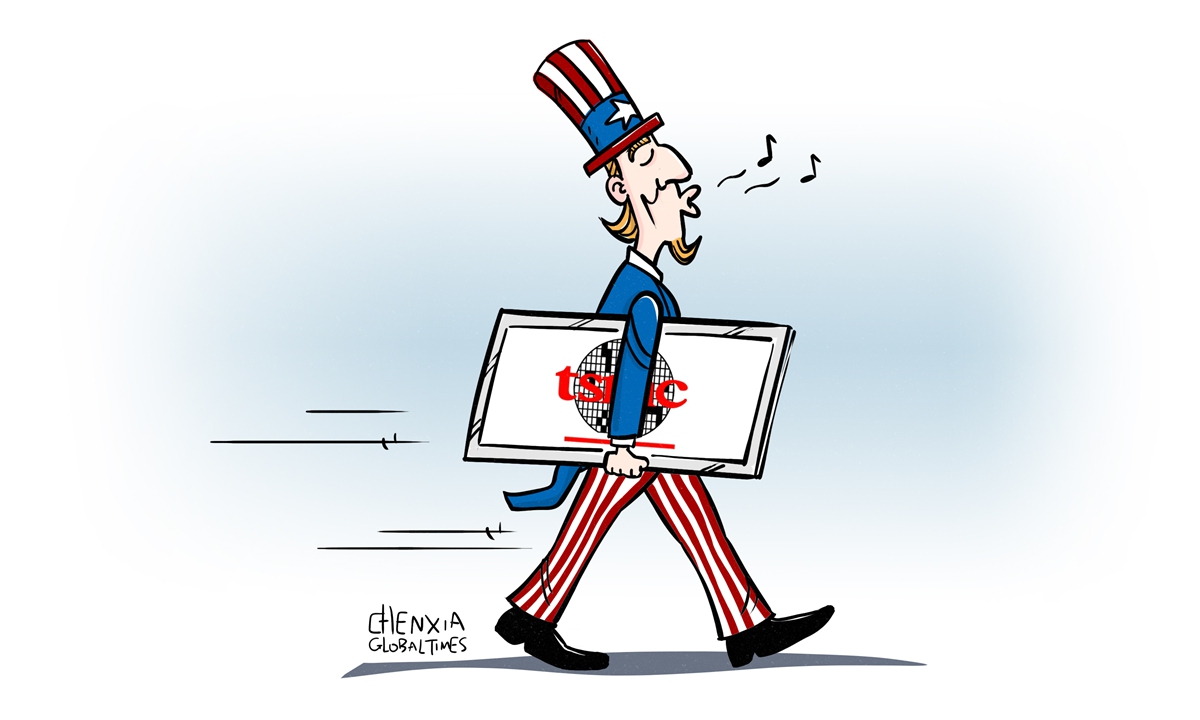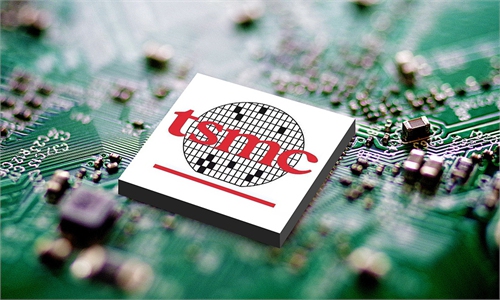
Illustration: Chen Xia/Global Times
Taiwan Semiconductor Manufacturing Company (TSMC) is in the spotlight once again after Morris Chang, the founder and former CEO of the chipmaker, confirmed that the company plans to produce its most advanced 3-nanometer chips in the US.Commentators have warned that Washington's efforts to win investment from the island's key chip and tech companies may have an impact on the Taiwan economy, while some people in Taiwan have fretted that making chips with a 3-nanometer process in the US will almost amount to an Americanization of TSMC's most advanced technologies.
TSMC's plan to produce its 3-nanometer chips in the US came at a time when Washington unveiled an industrial strategy to revitalize domestic manufacturing. The US government in August signed into law the CHIPS and Science Act of 2022, which includes more than $52 billion in incentives for domestic semiconductor production and research, as well as an investment tax credit for semiconductor manufacturing.
As global competitors invest big to attract advanced semiconductor manufacturing to their shores, the US is trying to gain unfair advantage and decouple its chip supply chain from Asia through non-market means. What should be pointed out is that Washington's selfish policies and trade protectionism will undermine the development of Taiwan's semiconductor industry and result in an erosion of manufacturing.
The island of Taiwan is home to industry-leading chip factories as well as an industrial base that supplies key components to global technology companies. Electronics is the backbone of the island's economy. A manufacturing outflow in the semiconductor sector is bound to deal a fatal blow to the Taiwan economy, but US politicians, focusing on revitalizing US domestic manufacturing through non-market means, don't care about the island's economic interests at all.
With the White House putting domestic production of microchips at the center of its economic policymaking, TSMC has reportedly started construction at a site in the US state of Arizona where it plans to spend $12 billion to build a computer chip factory. However, TSMC's development in the US has not been smooth sailing.
In June, TSMC Chairman Mark Liu told shareholders at the company's annual meeting that the facility in Arizona - its first advanced chip plant in the US - is turning out to be "more costly" than expected, according to Nikkei Asia.
The challenges of inflation, supply chain strains, labor shortages and increasing wage costs have been affecting the US manufacturing industry for a number of years. Even though TSMC has confirmed its plan to produce its most advanced 3-nanometer chips in the US, higher-than-expected cost will inevitable cause economic losses to TSMC and undermine its long-term competitiveness.
The Democratic Progressive Party (DPP) authorities were supposed to create supportive policies and a business environment for the development of the semiconductor industry on the island of Taiwan, but they chose to collude with the US and acquiesce or even indulge the transfer of the semiconductor industry chain out of the island. They traded the interests of Taiwan's chip industry for the political support of the US, severely damaging Taiwan's economy and industrial base.
The semiconductor sector is of great significance for the Taiwan island. Semiconductor exports accounted for 34.8 percent of Taiwan's overall exports and 70 percent of trade surplus in 2021. If the DPP authorities are allowed to acquiesce or indulge the transferring for TSMC's production to the US which has higher costs in labor and other aspects, this will undoubtedly cause severe impacts on Taiwan island's semiconductor exports.
The author is a reporter with the Global Times. bizopinion@globaltimes.com.cn



